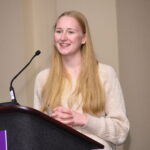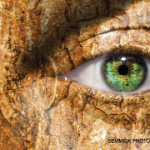Learning Self-Advocacy at Camp
Kaye Anderson, a student at University of Wisconsin, River Falls, who was diagnosed with juvenile idiopathic arthritis at age 10, said an Arthritis Foundation camp helped her to be her own advocate.
The camp, at which Ms. Anderson has now been a counselor for three years, is similar to other summer camps, but with more accommodations, such as wheelchairs available in case of flares and medical professionals on hand to help with disease management and treatment, and with educational activities useful for children wrestling with the disease.
The camp’s Seeds program, for example, focuses on self-advocacy and self-management. Children also learn about nutrition and low-impact exercise.
“I am so grateful for camp; it has taught me so many different advocacy skills,” said Ms. Anderson, who confessed that, at first, she was reluctant to attend the camp.
‘Once I was able to figure out how to use my story to help other people, & recognize how I could communicate with other people, that was really beneficial.’—Kaye Anderson
She has continued to develop those skills and they have helped her with her care, she said.
“The last few years, I’ve been struggling with pretty debilitating fatigue and nausea. And it took a long time for me to figure out how to appropriately say that to my rheumatologist in words they understood, so they [would] understand the severity of it.”
At one appointment, she needed to mention her fatigue three times, finally saying, “This fatigue is not manageable right now. I cannot keep functioning like this.’ And finally they understood.”
“I don’t think I would have had that ability to keep talking to them and keep bringing that up without camp.” She also credits the camp with helping her understand that, sometimes, her message doesn’t get across on the first try.
Ms. Anderson is also a peer mentor at her university, helping first-year students navigate their conditions in their new setting.
“Once I was able to figure out how to use my story to help other people, and recognize how I could communicate with other people, that was really beneficial.”
Sense of Humor Is Vital
In 2018, 20-year-old college student Catherine Ames was performing in the romantic comedy musical Crazy for You by George Gershwin. Her performance was nominated for a Kennedy Center award, but she couldn’t attend the awards competition. She’d been having pain, fatigue and muscle soreness, and “in the span of a few months, my health fell apart—I had too many symptoms to count.”




